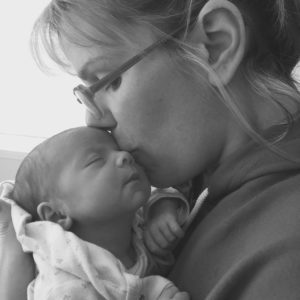
Postpartum depression: Facts and symptoms
Having a baby is one of the most beautiful things in life. But there is something no one tells us about it: postpartum depression. This has several symptoms that affect our mood after giving birth and it can be a traumatic experience if we don’t search for help.
First, let’s get something cleared: postpartum depression is not the same as baby blues. It is quite common for new mothers to feel a little sad, worried, or fatigued. As many as 80% of mothers have these feelings for a week or two following childbirth. It is completely normal and usually fades in a few weeks.
While some of the symptoms sound the same, postpartum depression is different from the baby blues. Near 10% of moms with newborns experience postpartum depression. This can happen because of the challenge that having a baby represents. It can cause a mix of powerful and different emotions, from excitement and joy to fear and anxiety. Plus, in the worst cases, to depression. Very rarely, an extreme mood disorder called postpartum psychosis also may develop after childbirth.
Most common symptoms of postpartum depression
- Gloomy mood: Your moods change suddenly and without warning, and you become irritable, anxious, or angry for no reason.
- Low self-esteem: Everything feels overwhelming and hopeless.
- Guilt: You feel worthless and guilty about your feelings.
- Sleep problems: you are exhausted but you can’t sleep, or you sleep too much.
- Fatigue: You have various unexplained aches, pains, or illnesses
- Hopelessness, sadness, or feeling overwhelmed or empty: you feel sad or cry a lot, even when you don’t know why
- Socially withdrawing from friends and family: You become insecure and feel the need of escaping from everyone and everything.
- Lack of emotional attachment or bonding with your baby: you feel disconnected from your baby and wonder why you’re not filled with joy like you thought you’d be.
- Suicide thoughts
- Thoughts of self-harm or of harming their baby
The main difference between the baby blues and the postpartum depression is the intensity and the duration of the symptoms. Baby blues can last a few days to a week or two after the baby is born and mothers don’t experience intense feelings such as suicidal thoughts.

Causes of postpartum depression
There is not a single cause of postpartum depression, but physical and emotional issues may play a role.
Physical changes: After childbirth, a dramatic drop in hormones (estrogen and progesterone) in your body may contribute to postpartum depression. Other hormones produced by your thyroid gland also may drop sharply — which can leave you feeling tired, sluggish and depressed.
Emotional issues: When you are sleep deprived and overwhelmed, you may have trouble handling even minor problems. You may be anxious about your ability to care for a newborn. In addition, you may feel less attractive, struggle with your sense of identity or feel that you have lost control over your life. Any of these issues can contribute to postpartum depression.
Postpartum depression isn’t a character flaw or a weakness: Sometimes it’s simply a complication of giving birth. If you have postpartum depression, prompt treatment can help you manage your symptoms and help you bond with your baby.
The most extreme case: Postpartum psychosis
With postpartum psychosis — a rare condition that typically develops within the first week after delivery — the signs and symptoms are severe. Signs and symptoms may include:
- Confusion and disorientation
- Obsessive thoughts about your baby
- Hallucinations and delusions
- Sleep disturbances
- Excessive energy and agitation
- Paranoia
- Attempts to harm yourself or your baby
Postpartum psychosis may lead to life-threatening thoughts or behaviours and requires immediate treatment.
When to see a doctor
If you’re feeling depressed after your baby’s birth, you may be reluctant or embarrassed to admit it. If you are experiencing any symptoms of postpartum baby blues or postpartum depression, you can book a doctor and schedule an appointment and learn about pediatric services! Our English speaking doctors in Barcelona are always ready to help you clear any doubts about postpartum depression and ways to treat it!
